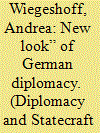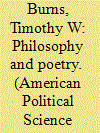| Srl | Item |
| 1 |
ID:
160226


|
|
|
|
|
| Summary/Abstract |
When established in 1951, the West German Foreign Office resembled its pre-1945 Berlin Ministry predecessor in many ways. Notably, about 45 percent of Bonn’s diplomats came from the old service. Such continuities raised concerns about a restoration of old diplomatic traditions and attitudes. However, significant changes in German diplomacy—its West German variant—soon became evident, not least in terms of diplomatic style and methods. This analysis explores how the Foreign Office’s staff adopted, promoted, or rejected such changes. It assesses institutional processes of transformation and examines why diplomats were willing to “re-learn” diplomacy after the Second World War. Likewise evaluated are the problems and limits of re-orientation. By focussing on (dis)continuities within the Foreign Service in the 1950s and 1960s, the analysis contributes to the general field of research on processes of transition in West Germany after the end of the Third Reich.
|
|
|
|
|
|
|
|
|
|
|
|
|
|
|
|
| 2 |
ID:
140175


|
|
|
|
|
| Summary/Abstract |
The subordination of poetry to rational guidance has been denounced as a symptom of a specifically Western sickness, with its origin in Plato's Republic. But Plato's disposition to the poets is more complex than is often supposed. Although Book Three's education in civic virtue includes a call for an austere, civic poetry, in Book Ten Socrates finds the wisdom of this provision to need a serious reconsideration, one made necessary because philosophy has emerged as the true answer to the search for a genuinely fulfilling, happy life. Book Ten's reconsideration quietly shows that great poets like Homer are wiser than the earlier examination had suggested, especially about death, and are even indistinguishable from Socratic philosophers in their understanding of and disposition toward death and so in the related matter of the best human life.
|
|
|
|
|
|
|
|
|
|
|
|
|
|
|
|